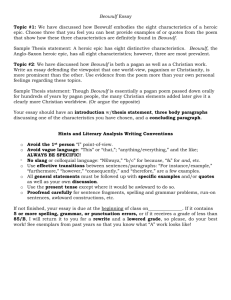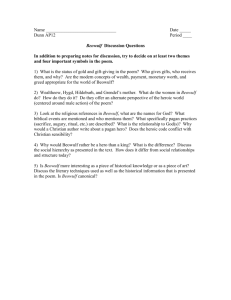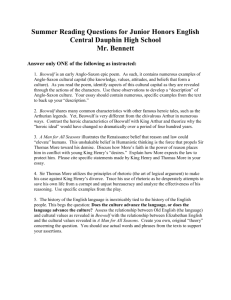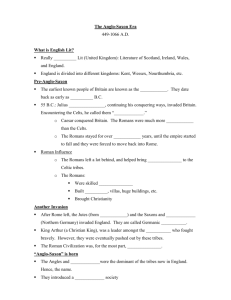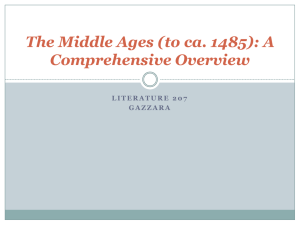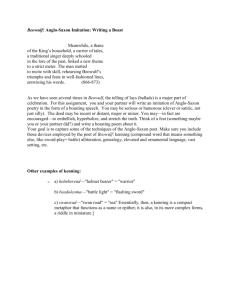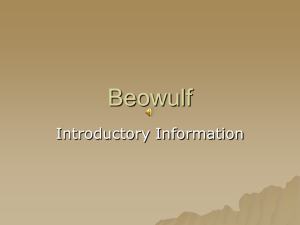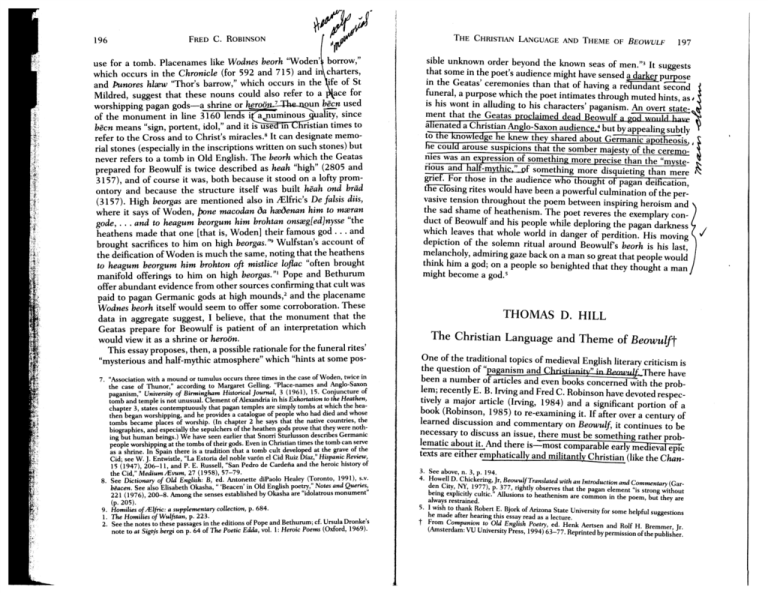
196
FRED C. ROBINSON
~o/
use for a tomb. Placenames like Wodnes beorh "WOden'~orrow,"
which occurs in the Chronicle (for 592 and 715) and in charters,
and Punores hlrew "Thor's barrow," which occurs in the ife of St
Mildred, suggest that these nouns could also refer to a ace for
worshipping pagan gods-a shrine or heroD 7
oun ~ used
of the monument in line 3160 lends i a numinous
ality, since
becn means "sign, portent, idol," and it is use In
ristian times to
refer to the Cross and to Christ's miracles. s It can designate memorial stones (especially in the inscriptions written on such stones) but
never refers to a tomb in Old English. The beorh which the Geatas
prepared for Beowulf is twice described as heah "high" (2805 and
3157), and of course it was, both because it stood on a lofty promontory and because the structure itself was built heah ond brad
(3157). High beorgas are mentioned also in JElfric's De falsis diis,
where it says of Woden, Pone macodan oa hreOenan him to mceran
gode, ... and to heagum beorgum him brohtan onsceg[ed]nysse "the
heathens made that one [that is, Woden] their famous god · · · and
brought sacrifices to him on high beorgas."9 Wulfstan's account of
the deification of Woden is much the same, noting that the heathens
to heagum beorgum him brohton oft mistlice loflac "often brought
manifold offerings to him on high beorgas."1 Pope and Bethurum
offer abundant evidence from other sources confirming that cult was
paid to pagan Germanic gods at high mounds,2 and the placename
Wodnes beorh itself would seem to offer some corroboration. These
data in aggregate suggest, I believe, that the monument that the
Geatas prepare for Beowulf is patient of an interpretation which
would view it as a shrine o.r heroDn.
This essay proposes, then, a possible rationale for the funeral rites'
"mysterious and half-mythic atmosphere" which "hints at some pos7. "Association with a mound or tumulus occurs three times in the case of Woden, twice in
the case of Thunor," according to Margaret Gelling. "Place-names and Anglo-Saxon
paganism," University of Birmingham Historical Journal, 3 (1961), 15. Conjuncture of
tomb and temple is not unusual. Clement of Alexandria in his Exhortation to the Heathen,
chapter 3, states contemptuously that pagan temples are simply tombs at which the heathen began worshipping, and he provides a catalogue of people who had died and whose
tombs became places of worship. (In chapter 2 he says that the native countries, the
biographies, and especially the sepulchers of the heathen gods prove that they were nothing but human beings.) We have seen earlier that Snorri Sturlusson describes Germanic
people worshipping at the tombs of their gods. Even in Christian times the tomb can serve
as a shrine. In Spain there is a tradition that a tomb cult developed at the grave of the
Cid; see W. J. Entwistle, "La Estoria del noble var6n el Cid Ruiz Dfaz," Hispanic Review,
15 (1947), 206-11, and P. E. Russell, "San Pedro de Cardefia and the heroic history of
the Cid," MediumJEvum, 27 (1958), 57-79.
8. See Dictionary of Old English: B, ed. Antonette diPaolo Healey (Toronto, 199 I), S.v.
beacen. See also Elisabeth Okasha, "'Beacen' in Old English poetry," Notes and Queries,
221 (1976), 200-8. Among the senses established by Okasha are "idolatrous monument"
(p.205).
9. Homilies ofJElfric: a supplementary collection, p. 684.
1. The Homilies ofWulfttan, p. 223.
2. See the notes to these passages in the editions of Pope and Bethurum; cf. Ursula Dronke's
note to at Sigrys bergi on p. 64 of The Poetic Edda, vol. 1: Heroic Poems (Oxford, 1969).
...
THE CHRISTIAN LANGUAGE AND THEME OF BEOWULF
197
l
sible unknown order beyond the known seas of men."3 It suggests
that some in the poet's audience might have sensed a darker purpose
in the Geatas' ceremonies than that of having a re~undant second
funeral, a purpose which the poet intimates through muted hints, as I
is his wont in alluding to his characters' paganism. An overt statement that the Geatas proclaimed dead Beowulf a god would bav£
alienated a Christian Anglo-Saxon audience. 4 but by appealing subtly
to the kriowled e he knew the shared about Germanic a otheosis •
e cou arouse suspicions that the somber majesty of the ceremo- ~
nies was an e ression of somethin more recise than the urn ste- ~
rlOUS an
alf-mythic," of something more disquieting than mere .~
grief. For those in the audience who thought of pagan deification,
the closing rites would have been a powerful culmination of the pervasive tension throughout the poem between inspiring heroism and
the sad shame of heathenism. The poet reveres the exemplary conduct of Beowulf and his people while deploring the pagan darkness ( ./
which leaves that whole world in danger of perdition. His moving
depiction of the solemn ritual around Beowulfs beorh is his last,
melancholy, admiring gaze back on a man so great that people would
think him a god; on a people so benighted that they thought a man
might become a god. 5
l
t
THOMAS D. HILL
The Christian Language and Theme of Beowulft
One of the traditional topics of medieval English literary criticism is
the question of "paganism and Christianjty" jn BeW.f7U!{ There have
been a number of articles and even books concerned with the problem; recently E. B. Irving and Fred C. Robinson have devoted respectively a major article (Irving, 1984) and a significant portion of a
book (Robinson, 1985) to re-examining it. If after over a century of
learned discussion and commentary on BeawulJ, it continues to be
necessary to discuss an issue, there must be something rather problematic about it. And there is-most comparable early medieval epic
texts are either emphatically and militantly Christian (like the Chan3. See above, n. 3, p. 194.
4. Howell D. Chickering, Jr, BeowulfTranslated with an Introduction and Commentary (Garden City, NY, 1977), p. 377, rightly observes that the pagan element "is strong without
being explicitly cultic." Allusions to heathenism are common in the poem, but they are
always restrained.
5. I wish to thank Robert E. Bjork of Arizona State University for some helpful suggestions
he made after hearing this essay read as a lecture.
From Companion to Old English Poetry, ed. Henk Aertsen and Rolf H. Bremmer, Jr.
(Amsterdam: VU University Press, 1994) 63-77. Reprinted by permission of the publisher.
t
- \.
'f
\...,"
.\)
198
THOMAS
D.
HILL
son de Roland) or unapologetically pagan or secular in their viewpoint (like the Tdin B6 Cuailnge or Egils saga). Beowulf is neit~.
Klaeber has spoken of "the problem of finding a formula which sat.j isfactorily explains the peculiar spiritual atmosphere of the poem,"
(1953 :cxxi, n.2) and thIS question remains an Important issue in
modern Beowulf criticism.
Obviously any issue which has received as much attention as this
one is difficult and the "solution" or, to be more precise, the way of
understanding this issue which I am proposing will inevitably be
somewhat controversial. To put the matter succinctly, I think the
Beowul - oet is resentin a radical s thesis of
hristiail
istory-which is without parallel in Anglo-Saxon or Anglo-Latin lit~rature (so far as I am aware). There are, however, parallels in.QM..
1 !rish..and Old Norse-Icelandic literature; it is a fascinating although
perhaps unresolvable question whether there was any direct intellectual or literary influence between these literatures in the early
Middle Ages.
It is necessary first to define the ideological problem which the
Beowulf-poet (and reflective Anglo-Saxons throughout the era)
.
the Anglo-Saxons (like most archaic peoples)
faced. To be'
were dee I conservativ nd venerated antiquity. The evidence for
this proclivity is massive and pervasive. Good swords in Beowulf, for
example, are inevitably "old"-ideally a sword is "the work of
WeIand" the archetypal, oldest and thus the best smith. Anglo-Saxon
ideas about-their legal definition of-aristocracy and kingship are
obscure to some degree, but it is clear that Anglo-Saxons venerated
"old" families and that the ideal of an ancient royal line extending
far back into the past was an important ideological concern shared
even by a Churchman as hostile towards Germanic antiquity as
Alcuin. l As far as Anglo-Saxon secular literature is concerned, there
is ample evidence of its deliberately archaic and archaizing character.
Leaving aside Beowulf itself, Widsith and Deor reflect remarkable
and extensive knowledge of the Germanic past. 2 There is also evidence within and without Beowulf that Anglo-Saxon poets knew and
recited poems now lost about the heroes of the major cycles of Germanic heroic legend as they are known to us from the extant heroic
literature preserved in Middle High German and Old NorseIcelandic.
Anglo-Saxon Christians, however, had to deal with a problem
which all European Christians of the first millennium faced, the
U
1. On the Anglo-Saxon genealogies see Sisam (1953), and Hill (1988). For an interesting
comment by Alcuin reflecting his belief in the grefa (victory bringing luck) of a Woden
descended king, see Epistola 129 (Duemmler, 1895:129).
.
2. The editions of those poems by Kemp Malone (1962/1966) provide a useful and illuminating compendium of information which graphically illustrates the extent of the Germanic learning of these poets.
(
;~ 1/- -~
.- .-IAA'Z,., ~
VV~ ~~"v-r."
'i;/tA
\
':\
~ J\.~
THE CHRISTIAN LANGUA~,~~_~HEME OF BEOWULF
199 ~
,~ ~ simple and unarguable histoqcal fact that " anit itself, and in
I
. ~\ particular their Christianity, was not particularl 01 The
\ ~"t Beowulf is much controverted, but there are no conclusive arguments against dating the poem to the age of Bede, a date which was
.•.
.'t[ 'l~ ~ favoured by a majority of Beowulf scholars of the last generation, and
., . ~. which is still perfectly possible and plausible. Indeed the argumenDs
.~ tt for a late dating of the poem are motivated in part by a quite under~: .:
~ standable scholarly concern that the reasonable guess-that Beo'J\
wulf, is relatively early rather than relatively late-should solidi
\into a secure "fact" by dint of much repetition. 3 I should perhaps" ·
add that while I myself am agnostic about the dating of Beowulf, I
•
l......
find the arguments for an early dating suasive and the
congenial.
,,~~~ At y r whether w
t the early or the late dating of Beo~~'~" wul °t IS clea that reflective glo-Saxon must have been aware~
that the
0
IS n
a an an Germanic
an t at Christianit was a relativel recent innovation among a peo)
~ ""- ~ p e to w om antiquity was recious and innovation sus ect.
r~1
~ ~i
ne 0 t e ways in which medieval authors ea t with the problem
II"
of paganism and its consequences was to pretend that the history of
~ ~ ~.: their nation began with the conversion to Christianity and that noth~ ~ ~~ ing of real consequence happened before that momentous date.
1. Bede is a conspicuous exemplar of this tradition of historiography\the pagan Anglo-Saxons receive very muted treatment in the Historia
Ecclesiastica. The sins of the Christian Britons re eive much more
emphasis than the heroic accomplishments of the agan Anglose claims
Saxons and Jutes. But a secular Anglo-Saxon aristocrat,
and
to prestige and authority depended in part on an anci
therclQre necessarily pagan lineage, would be much less incline
.~ ignore the achievements of his pagan ancestors than a monk cut off \l~
om his own family and culture.
Some hterary histones address the "pagan" heritage of the Anglo'{fI
Saxons as if that heritage was limited to the few references to Woden
in the poetic corpus and the Anglo-Saxon charms-which are almost • ~
always treated as' if magic as as marginal and "low" in Anglo-Saxon ~
society as it is in ours f e had a fuller co
n
secular poetry we mi h well have more material abou.t the An 10axon pagan pant eon rather than havin to de end so heavil on
~
orse- ce an ic t ts or information about Germanic DaQanism
I
~""\
:1"
t
POSSibility~
IS'
i.J ,.~.~~t
~
'"~,,
~
~~.~;.
o'
~I
i
~
3. On this problem see the\essays collected in Chase (I981)....
rt
dM~/~'
200
OlrLIJe THOMAS
D.
_~'-t~~~?
HILL
'
AngIO~
ing aside the literary evidence of interest in the pagan past in
=Saxon England, this heritage was of interest to Anglo-Saxons in way ,
much more immediate than in their choice of songs and stories t
listen to. The Anglo-Saxon state-the kingdom itself (or for most f •
this period the various Anglo-Saxon kingdoms)-was founded b
pagans. The kings ruled by virtue of a claimed descent from Woden.
And if royal descent and royal genealogies were presumably rather
remote from the daily experience of most Anglo-Saxons, the gene~
alogies of the lords of the shires were of more immediate concern.·\
Every Anglo-Saxon freeman was expected to have a lord whose clai
to aristocratic status was based on aristocratic descent extending into
the far past. And in the age of Bede (a perfectly possible milieu for
the composition of Beowulf) no Anglo-SaxoD could claim more than
three or four Christian ancestors. Modern historians would of course
insist that most if not all of these claims to genealogical antiquity
were fraudulent or exaggerated and that powerful men simply
adorned their present power with fantastic claims that their ancestors had been similarly powerful in the remote past. For the purposes
of the literary historian, however, it is not the truth or falsehood of
these claims which is at issue, but rather the ideology implicit in
such claims and the fact that royal and aristocratic authority-no
matter how devout a Christian a given Anglo-Saxon might be-had
to have pagan roots. Anglo-Saxon law was similarly Germanic and
pagan in origin, and in so far as it was law based on the idea of
( personal vengeance, could be reconciled with Christian ideals of forgiveness and universal justice with difficulnr·
I would submit that a YOung Anglo-Saxon warrior who was
schooled in Germanic heroic legend, whose claim to aristocratic
status extended far into the pagan past, whose law was the old law
confirmed by his people since time immemorial, whose homeland
had been won by pagan warriors, who bore on his person ancient
pagan ornaments, who defended hiJPself with an old ~word purportedly made by WeIand and certainly made by pagan craftsmen, and
whose landscape was dominated by magnificent burial mounds in
which the great men (and women) of his race were buried in pagan
( splendour, had much reason to res ect the a an herita e of his
people no matter ow ious he was and no matter how dee 1 e
venerate the Church and the priests, the monks, and the nuns who
served It. Such a young (or old) aristocrat faced a deep cultural conflIct since the dominant authorities in the Church in this peridd
would not, or to put the case more accurately, could not accept the
claim that the paganism was a legitimate mode of religious and cultural self understanding. If paganism was legitimate, if pagans too
could be saved, what was the point of Christian faith and Christian
ascesis?
0n
I
L-
THE CHRISTIAN LANGUAGE AND THEME OF BEOWULF
201
This cultural problem of how to reconcile Christian faith with an
appreciation for the cultural.achievements of the pagan past IS an
issue which recurs throughout the history of Western EuroEean
thought-this was after all a central concern of that complex intelICctual mo,rement we call Renaissance humanism. And there have
been differ€nt responses to this problem at different places and times
"in the history of Christian thought. The spectrum of these responses
varies from Augustine's statement that the virtues of the a..ncient
Roma'M~re splendid vices, to Erasmus's invocation o~_Socrates as
a saint omght
eaking, we may say that Christian thinkers who
felt relativel secure bout their own culture and faith have tended
,/'-' I\l
to be receptive 0 t e merits of pagan past whether it be classical
Latin and Greek or Celtic or Germanic paganism, and those who
felt themsel\Te t reatene y it have harshly rejected "paganism" and
pagan cultu~ ertain y in the history of Western European Chris~
tianity the humanists won their case and the classical pagan authors
became central in the traditi
.stian European ·education.
The beautiful quotation fro Leo XIII 'th which E. K. Rand concludes his magisterial review 0 t is problem is the utterance of a
man supremely confident in his own faith and Christian culture:
t~.~~
·~t
Quarum rerum utilitate perspecta Ecclesia Catholica quemadmodum cetera quae honesta sunt, quae pulchra, quae laudabilia
ita eninl humanarum litterarum studia tanti semper facere consuevit quanti debuere in eisque provehendis curarum suarum
partem non mediocrem perpetuo collocavit.
>..
~
v.....
1
t
,
Perceiving, then, the usefulness [of the literatures of Greece and
Rome,] the Catholic Church, which always has fostered whatsoever
things are honest, whatsoever things are lovely. whatsoever things are •
otgood report. has always given to the study of the humanities the favor
that it deserves, and in promoting it, has expended no slight portion of ~
its best endeavor. 4
The point is that while there is a tradition of Christian hostility
and susEicion towards the pagan past, there has also been a mo~
Eositive and receptive attitude which is clearly recognIsable In the
high Middle A es and later and which seems to be reflected in Beo- V
wu If·Hostility towards pagan cu ure was ase In par on e historical situation of any given Christian author, but it was also based
in part on individual temperament. The teaching of the Catholic
Church is not univalent and unequivocal concerning this problem..
It is perfectly true that a famous clause from the Athanasian creed
states that "extra ecclesia nullus salvus est", but even for the rigorous
theologians who constructed this creed, the term "ecclesia" must
4. Quoted from Rand (1928:68, 299).
202
THOMAS
D.
HILL
include the patriarchs and such righteous gentiles as Melchisedech
and Job. Dante's equivocation suggests something of the complexity
of the probkm. In accordance with the austere tradition of Catholic
rigorism, he situates such pagans as Virgil and Aristotle in a pleasant
but sad limbo s~tuated before ~, but ~ who is as much a pagan
as any other is a guardiallOf Pur ato ,and a certain Rifeo-known
on y om two ines in the Aeneid as the "iustissimus unus / qui fuit
in Teucris et servantissimus aequi" (II. 426-27) is, according to
Dante, in heaven. Dante, like the Beowulf- oet seems to have
thought that some genti e pagan eroes could be saved, but un1 e t e
eawu - oet, he is ve cautious and hesitant about this
e9ssi i ity.
There are of course various solutions to the problem of the "peculiar spiritual atmosphere" of Beowulf and indeed it is possible to
ignore the problem altogether, but it seems to me that the most
consistent way to read the poem as we have it is to assume that the
~ ~ Beawul - oet
em and had
~
arrived at (or had been tau ht) an essentiall 'humanistic reading
of his forefathers' paganism. He seems to have be Ieve
at t e est
and greatest of these men knew about God, creation, and natural
moral law, and that when they died their souls went to heaven. 5 All
of the
.
can be explicitly supported from the text, but there
are two problems
ich must be faced before we can simply define
the e
-poet as a Germanic humanist and turn to other problems. One is internal-the other and more serious one-external.
From the point of view of the literary historian concerned with
"the peculiar spiritual atmosphere of the poem," Beowulfis a remarkably consistent text in that the religious language of the poem reflects
the religious knowledge of those patriarchs who lived before the covenants and the creation of Israel. It is useful to have a term to define
the religion of Beowulf, Hrothgar, and the good Germanic heroes in
the poem and I would suggest that we define them as Noachites,
that is, as gentiles who share the reB ious herita e and knowled e
of Noah an
is sons without havin access to the revealed knowle ge 0
0
w IC was grante to Abraham, Isaac and acob a
tra Ition cu minate by the reve ation of the Law to Moses and continued by the charismatic tradition of prophecy in Israel. Every reference in the poem which touches on reli ion can be understood in
t ese terms except or one-lines 179-83 in which the poet apparently condemns Hrothgar and the Danes for idol worship.
ere can be no question that this passage presents a major difficulty for those of us who would argue that the Beowulf-poet is
@
5. For a magisterial study of Christian ideas and Christian language in Beawulf, see Klaeber,
1911-12. For a recent discussion of the salvation of the heathen in Beawulf, see Hill
(1988).
THE CHRISTIAN LANGUAGE AND THEME OF BEOWULF
203
consistent and careful in depicting the good pre-Christian heroic
figures in the poem as monotheIstIc Noachltes. One si I ID1lltii
to thIS dIffiCUlty IS to assume that these lines are an interpolation by
~ho was offended by the "humanistic" depiction of prenstIal1 heroes and heroines in the poem. This solution was favoured (with some reservations) by Tolkien (1936:294, n.34) and
Whitelock (1951 :78). We have only one manuscript of the poem and
there are a number of junctures in the poem in which lines or entire
passages have been lost. Interpolations are easily understandable
from a paleographical and codicological point of view; and the motivation for an interpolation at this point is also readily understandable. The usual criterion for determining whether a given passage is
integral or an inte olation in a iven text is whether the sus ect ~I
passage i ers either stylisticall or conce tually from the text i ~.
w IC It occurs as a w
f it is in some way markedly differen
rom its immediate context, then one can reasonably argue that it
was not part of the original text.
---7In this instance the;ef@.an immediate discrepancy between th~
condemnation of paganism in Beowulf and the remainder of the
poem. I he poet who is respon;ible for this passage states unequivocally that pagans such as the Danes do not "know" the identity of
the true God, "metod hie ne cujJon, / deeda demend, ne wiston hie
drihten god / ne hie herian ne cujJon, / wuldres waldend." (II. 180-)
83: 'They did not know the Lord, the Judge of deeds nor did they
know of the Lord God, nor ala they know how to praise the Ruler
of Glory.) This claim is of course generally true of "real" "historical"
Germanic paganism. Germanic pagans, like the Romans and the
Greeks, worshipped a variety of gods and did not know either the
appropriate names for God or the formulas of worship which were
current in Christian Latin tradition.liilBeowulf, however, such his-.
torically pagan figures as Beowul~d ~thgar know, worship and
thank the one God of Judea-Christian faith for the blessings of their
lives, kDow that God judges deeds, and if we accept the straightforward hteral significance of the formulas which characterise their
deaths, ascend to heaven after their deaths. Indeed, forty-five liRes
or so after the flat assertion that the pagan Danes do not know how
to worship the Lord, the Beowulf-poet speaks of how the equally
pagan Geats gave thanks to God after their successful sea voyage:
"gode jJancodon / pees j:Je him yOlade eaOe wurdon." (11.227-8; 'They
gave thanks to God since the sea passage had been easy for them.')
Beowulf and his men cannot be ChristiaJ: but their prayer is characterised by a Christian formula and they are praying at an appropriate time and in an appropriate manner from a Christian
perspective. And there are numerous other passages in the poem in
which characters who would have been "¥storicaJJy" pagan, speak
,)
204
THOMAS
~~
D. HILL
~\
THE CHRISTIAN LANGUAGE AND THEME OF BEOWULF
205
I.J '
~' J
about God and religious issues from a "Noachite" perspective. The
discrepancy between the poem as a whole and the condemnation of
the Danes' idol worship is absolute~the Beowulf-poet forgot
~
for a moment to maintain the careful balance which he maintains
"
elsewhere in the poem-in which the admirable heroic figures in the ~
poem speak about religious matters from a monotheistic perspective, ~~.
(f'
but know nothing of revealed religion-8 someone else added that" ~
passage to the poem.
~
This condemnation of the idol worship of the Danes is in itself a
problem for this argument, but one which can be dealt with by the
~
simple assumption that the text of Beowulf is corrupt at this point.
A larger problem, however, which bears on this argument, and WhiChl'
has led a great many distinguished scholars to be very hesitant about
~ accepting what the simplest and most direct understanding of what
,
~the language of the poem would seem to imply, is that no oth~
)
Anglo-Saxon or Anglo-Latin authors who deal with the pagan past ~ • ,
of the Germanic peoples seem to have been at all sympathetic Jp ~
paganism or to any other aspect of the culture of the ancient Germanic peoples. At varIOUS tImes In the history of Christian thought,
Christian authors have been more or less sympathetic towards the
excusable ignorance of those who lived before the advent of Christianity, but in the Latin west in the early Middle Ages Christian Latin
authors were univocal in t6eir condemnation of the pa an ast. t ~
Alcuin's famous remarks about the monks at Lindis arne who lis~
tened to heroic poetry are so frequently quoted that Anglo-Saxonists
are weary of them and yet the passage is worth citing because of the
clarity, force, and directness of Alcuin's language:
wulf are not strictly speaking pagans, but rather monotheists, Noachites, as I have chosen to call them. In this respect we may begin by
observing that the Beowulf-poet is (as far as we know) historically
wrong since the pre-ChristIan Germanic peoples were in fact pagans
who worshipped a number of different gods and there is no historical
evidence that any of these peoples anticipated the distinctive JudeoChnstIan claim that there is one God, who created the heavens and
the earth (Beowulf lines 90-98) and who governs the course of history (Beowulf lines 696-702). In a strict sense the Beowulf-poet is
not beIng partIcularly sympatlietic to pagans-with the problematic
exception of lines 175-88 he does not even mention pagans or pagan
~
worship. (He does mention pagan burial ractices
.s
~~
another an a s eCIa 0pIC. ----'i!!>4«• (,./il.
In this respect the Beowu -poet seems wholl sui generis· 0 other ~ ~
Anglo-Saxon author seems to have made such claIms a since most
~
medievalists are very reluctant, and generally rightly ,to accept
,
any feature of a medieval poem as essentially original, rna y Beowulf ·
scholars are not inclined to accept the implications of the hristian
~' '\
language of the poem at face value. Thus when Beowulf sa of his
~~
grandfather Hrethel that when he died "godes leoht geceas" line
2469) 'he chose God's light'-language which in a Christian cont t
would clearly imply that the person who died went to heaven-many
scholars implicitly assume that the poet is more or less thoughtlessly
using Christian formulas without careful attention to their implications. If there were only a few instances of this kind of usage, or if
~
there was more in the poem which reflected conventional Christian
hostility to the pre-Christian past than one suspect passage, then
one would, in my judgment, be justified in assuming that the Beowulf-poet was conventional or muddled in his thinking about these
problems. The poet is, however, quite careful and consistent in his
treatm811t of religious issues and his use of religious language, and
I would argue that it is necessary to view this aspect of the poem
from a somewhat broader perspective than AIlglo-Saxonists generally
do and to consider the poet's depiction of the religion of such figures \.
as Beowulf and Hroth ar in the context of Celtic (particularly Old 'V
Iris and Old Norse-Icelandic literary history as well. In so doing I
am following the suggestions of J. R. R. Tolkien and in particular the
arguments of Charles Donahue (Donahue, 1949-51).
We may begin by observing that Anglo-Saxon literature is pre~I ~served in fragmentary form in that we only have a small portion of
what was once a very extensive corpus. Almost every Anglo-Saxon
poem, for example, is preserved in a single manuscript copy. Even
the much more extensive corpus of Anglo-Latin literature is only a
portion of what once existed. Did the abbot or monks at Lindisfarne,
for example, defend themselves against Alcuin's attack? This raises
i
~1
i-
i
Verba Dei legantur in sacerdotali convivio. Ibi decet lectorem
audiri, non citharistam; sermones patrum, non carmina gentilium. Quid Hinieldus cum Christo? Angusta est domus:
utrosque tenere non potuit. Non vult rex ~elistis cum paganis
et perditis nominetenus regibus communionem habere; quia rex
HIe aetemus regnat in caelis, HIe paganus perditus plangat in
inferno.
./
Let the words of God be read at the meal of the clergy. There it is proper
to listen to the lector, not a harp-player; the sermons of the Fathers not
the songs of the people. For what has Ingeld to do with Christ? Narrow
is the house; it cannot hold both. The King of Heaven wants nothing
to do with so-called kings who are pagan and damned. For the eternal
King reigns in heaven; the damned pagan laments in hell. 6
The BeOwulf-poet is even more anomalous in the context of early
medieval Christian thought in that the admirable characters in Beo6. Aleuin, "Epistola 124" (Duemmler, 1895:183).
n\)
t
6"
206
THOMAS
D.
HILL
another problem which needs at least to be noted. Alcuin's works
were preserved because he was an eminent and orthodox Catholic
authority. The protest of a secularized abbot would have received
much less respectful attention. This is not to raise again the fantasy
of narrow minded monks erasing the remembrance of a religiously
"incorrect" past, but simply to observe that the preservation of the
texts which we have occurred in a particular religious and social
milieu, and that the character of that milieu affected what was preserved. For better or worse, Beowulf is the only lengthy secular poem
preserved in Old English and it is preserved in one manuscript which
was nearly lost. By contrast there are over thirty manuscripts of Aelfric's second series of Catholic Homilies. It is hardly a novel observation that secular texts, even secular texts written by Christian
authors, reflect a significantly different perspective than specifically
Christian literary texts, particularly so if the latter are written by
clerics or monks. If we had more Anglo-Saxon secular literature,
j Beowulf might seem much less anomalous than it does when compared with the rest of the Old English poetic corpus, which is almost
' all specifically religious.
Again it is important to remember that much of the Christian
l\
Latin literature which deals with the conversion of the Germanic
'\'
pagans was written generations after the actual conversion process
and the authors of these texts had an obvious interest in depicting
the conversion as a straightforward and relatively quick one in which
the missionaries had no occasion to make compromises and in which
their new converts understood and accepted their new faith without
hesitations or doubt. The. actual process of conversion must inevi~ly have involved many ambiguities and complexities, and even
willing converts could only have ac uired a relativel so histicated
un erstan ing 0 t eir new aith after years of instruction and worship. In fact, on the level of popular Christianity there is ample evidence for the existence of semi-Christian magic and folk-belief as
exemplified most clearly in the Anglo-Saxon charms which were current for generations after the conversion. Thus if the Beowulf-poet
seems to exhibit anomalous views about such topics as the salvation
of unbaptised Germanic kings and heroes, we must remember that
there is a great deal of evidence for other "unorthodox" religiouS,.
./ ideas bein current in An lo-Saxon litera culture even if this articu ar unorthodox idea seems unique to Beowulf.
If the Beowulf-poet's ideas about the existence and salvation of
Germanic Noachites cannot be paralleled in Old English or AngloLatin literature as such, these ideas can be paralleled readily enough
in the two vernacular literatures which are geographically and culturally closest to Old English literature. Both Old Irish and Old
,
ef
THE CHRISTIAN LANGUAGE AND THEME OF BEOWULF
207
Norse-Icelandic literature are "insular" literatures in that both languages were spoken as native languages in England. and Scotland (\
during the Anglo-Saxon period. Again, both Old Irish and Old Norse~
Icelandic literature possessed a rich literary tradition which was originany~One of the immediate contrasts between Old French
epic tra ltIon and the heroic literature of the Anglo-Saxons, the
Norse and the Irish is that the heroic literature of these insular peo- ___
pIes is much more archaic and looks back to the pagan roo
ese
nations. For linguistic and historical reasons
storical memory
of the romance speaking peoples of Europe simply did not extend
before the advent of Christianity; their "pagan" epics were the classical Latin epics.
In Old and (early Middle) Irish secular literature the ollaimh, ollaves and the bards faced an ideological problem quite similar to that
which the Beowulf-poet faced in that the traditional heroic literature
of the Irish peoples concerned heroes born long before the advent
of Christianity. It seems clear, however, that the learned secular
authors of Ireland were willing to argue that their great heroes were
saved and are now in heaven although the ways which the authors
of these texts devised to achieve this happy result reflect a bold au9
imaginative effort on their part. Thus in the death tale of Conchobor,
Conchobar is wounded (the solidified brain of a slain enemy is
embedded in his skull) and only partially healed-any excitement
will kill him. He remains seven years in this parlous state until he is
told of the passion of Jesus, leaps up to lead an onslaught of the
Ulstermen to avenge this crime, and dies as an Irish martyr to the
faith (Cross and Slover,7 1969:346). According to "The Phanto~
Chariot of Cu Chulainn" Cu Chulainn was summoned out of hell
by Saint Patrick in order to convince the high king of Ireland of the
merits of Christianity, and Cu Chulainn persuaded Patrick to
arrange for his salvation during this process (Cross and Slover, 1969:
354). The death tale of Cu Chulainn concludes with Christian
prophecy by the spirit of Cu Chulainn and in "The Colloquy of the
Old Men" Patrick's guardian angels specifically assure him that it is
appropriate for him to listen and to record the stories of the fian and ~ ~
so Patrick himself and his clerics record the stories from the lips of ~
Ossin (Cross and Slover, 1969:464). It is difficult for someone who
~
is not a specialist in the field to evaluate and interpret the complex"
l
narrative strat~ies by which the authors of these texts reconcileat least on a formal level-the conflicting world views of Old Irish ~
heroic legend and Christianity. A broad generalisation does seem
1
'f
'i
7. The 1969 reprint of this anthology contains a bibliographical supplement which directs
the reader to the Irish editions of these texts.
208
THOMAS
D.
HILL
(4~
lL~
appropriate however-the Irish bards and ollaves wer sure enou h f
themselves and their literary and cu tura ra I Ions 0 calm t at t eir .11
great "pagan" heroes and kIngs were saved and rejoicIng In the Chris- \
tian heaven-heaven itself would be a poorer place without them.
In some ways Old Norse-Icelandic hterary tra8ition is more
directly relevant to Beowulf than Old Irish secular heroic prose. Old
English and
se-IcelandLc are cognate languages and can be
defined as co nate tera".,~~. 'there are many striking parallels
between the
erary traditions and there was much contact and
mutual influence between the two. Hence the treatment of "paganism" or to be more precise, pre-Christian religious ideas in the family
sagas is important for students of Beowulf in that Icelandic secular
literature rovides the closest a roximation of the lost secular literature 0 Anglo-Saxon England whic sti exists. 0 vious ywe cannot treat Icelandic texts of the high middle ages as if they could
provide direct evidence of what we have lost, but Icelandic literature
is an important resource for the Anglo-Saxonist and indeed has long
been recongnised as such.
For the purposes of the present discussion, one immediate proble.m with the issue of the presentation of the conversion from Ger.manic paganism to Christianity in Old Norse-Icelandic literature is
that this literature is so rich that one could write extensively about
the problem without even beginning to treat it adequately. For two
relatively recent discussions see Lonnroth (1969) and Harris and
Hill (1989). In the context of this paper I wish to concentrate on
one particular literary text which is strikingly similar to Beowulf in
its treatment of "pagan" ·heroes who are nonetheless committea
monotheists set apart from their pagan surroundings. Vatnsdrela
.§.aga is anJnteresting text of considerable literary merit, but no one
would claim that it is one of the great literary monuments of the
period. The saga is a family saga concerned with the history of a
given family over generations and the author of the saga makes several quite distinctive claims about the early history of this family.
One is that unlike the other great founding families of Iceland who
were at odds with Harald the Fairhaired, the leading men of this
family were actually on good terms with him and emigrated to Iceland because of the power of fate as articulated by the disappearance
of a magic amulet and its reappearance in Iceland. Again the family
had their own distinctive form of religious commitment. When the
first bishop arrives to convert the Icelanders Thorkel krafla demurs:
l>orkell kvazk eigi vilja aora tru hafa-"en peir l>orsteinn Ingimundarson hQfou ok l>6rir f6stri minn; peir truou a pann, er
s6lina hefir skapat ok Qllum hlutum rreor."
(Vatnsdrela saga, kap. 46 [Sveinsson, 1939: 125])
THE CHRISTIAN LANGUAGE AND THEME OF BEOWULF
209
But Thorkell said he did not want a faith different from that Thorsteinn)
Ingimundarson and the rest of them had held-and Thorir my foster
father. They believed in Him who made the sun and ruled all things.)
&
The bishop, of course, quickly explains that this faith is perfectly
compatible with Christianity and Thorkel and his family, after soiite
hesitation, are converted. The monotheistic and ethical principles of
the pre-Christian Vatnsdrela dwellers are mentioned repeatedly
throughout the saga. These men not only knew that one God had
created the sun and ruled all things but that aggressive behavior was
morally wrong (cap. 11) and that God would,punish or reward men
according to their deeds (cap. 23) and the theme of the one god who
made the sun recurs repeatedly. In terms of historical plausibility
the edifying moral monotheism of the Vatnsdrela family before the
conversion is historically unlikely and since there is much magic and
fantasy woven into the saga, one might be tempted to dismiss this
aspect of the saga as simply late pious fantasy projected into the far
past. It is important, however, to distinguish between Vatnsdrela saga
as an aesthetic success or failure and its literary historical interest
as an attempt to bridge the gulf between the pagan Germanic past
and the Christian present. The author of Vatnsdrela sag,a like tb~
Beowulf-poet was attempting to reconcile pious antiquarian syrnpaffiy tor the Germanic past and the claims of Christian truth. The
kind of dogmatic hostility to the Germanic past reflected in Alcuin's
letter about the monks of Lindisfarne was as current in thirteenth
century Europe and Iceland as it was in Anglo-Saxon England, but
it did not prevent the author of Vatnsdrela saga from depicting noble
monotheistic pre-Christian Germanic heroes just as the Beowulfpoet had done before him. To summarize then, the peculiar spiritual
atmosphere of Beowulf looks a good deal less peculiar and unique if
one compares the poem to the other heroic literatures of Northern
Europe whose poets and learned men faced the kind of ideological
problem which the Beowulf-poet faced. There are other similar
depictions of the pagan past currellt in Ola Irish and Old NorseIcelandic literature and a simple solution to the problem of Chris- ..
tianity in Beowulf is to assume that the Beowulf-poet approximated
the solution that these other authors arrived at ei her in
tly
or as t e resu t 0 the influence of poems and historjes now lost.
.
This discussion of the Christian context of Beowulf is necessarily ,
controversial and partial; there are a number of smaller problems
which could receive fairly extended discussion in thei~:b~';
Thus, for example, the poet alludes to the practice of s rtile e
lines 202-04; this is a "pagan" practice but one sanctione y the
precedent of Old and New Testament practice. Again, there is the
problem of lines 589-90 in which Beowulf apparently threatens
.~
1g'
1'\.,
210
~
.~
~
~
J
THOMAS
D.
HILL
Unferth with hell-torment, an anomaly convincingly explained by
Fred C. Robinson (1974:129-30). These smaller problems lead us
to a larger issue, however, which is that there is no received answer
to the question of the "peculiar spiritual atmosphere of Beowulf"
and eminent and well respected Anglo-Saxonists have offered quite
divergent interpretations of this problem in the poem. Of the most
recent discussions of the issue I particularly recommend that by Fred
C. Robinson in Beowulfand the Appositive Style; Robinson's conclusions are quite different than mine, but they merit careful attention.
Again, E. B. Irving has reargued the more traditional view that the
Beowulf-poet was bound by and committed to the traditions of Germanic poetry and simply was not concerned with theological
consistency. In a sense both these scholars are arguing for a more
traditional and "orthodox" view of the Christianity of the Beowulfpoet than my argument would imply. Robinson is arguing that the
Beowulf- oet was deeply concerned about the paganism of his
c aracters, but had to accept tears tra ltIona views 0 c
men such as Alcuin.2-whereas Irving simply thInkS that the poet was
unconcerned with theological issues. In contrast,..!.!m arguing that
on this crucial ideological issue the Beowulf-poet was willing to question the authority of what must have been the majOrIty 0plnlon"f
the church of his time. The language of the poem can be most readrty
understood in these terms, but many scholars are reluctant to grant
that an Anglo-Saxon poet could have challenged the authority of the
church so directly. There are other Old English and Anglo-Latin
texts which reflect the tension between a natural respect for traditional Germanic culture and the radical and exclusive claims of
Christian faith; but there are none which so clearly affirm the positive, admirable, spiritual dimension of Old Germanic culture as the
Beowulf-poet does. (It may also be added that the Beowulf-poet was
keenly aware of the problematic features of the Germanic heroic
ethic, but that would have to be the occasion for another paper or
monograph.) When one considers the problem in a somewhat
broader perspective, however, both the achievement and the ideological perspective of the Beowulf-poet come into sharper focus. We
can see more clearly if we broaden our perspective.
I would be surprised if the problem of the "peculiar spiritual
atmosphere" of Beowulf did not continue to be the occasion of
scholarly controversy, but I do think it is im ortant that the
"humanistic" sym athy which the Beowul - oet exhi .
s
t e best of t e ~a:an ~st is not "heretical" eyen if it was (appa r ..
endy) a minority View jT; the An~lo-Saxon church. As time passed
and the western church emerged from the trauma of the destruction of the Roman empire, "high" medieval and renaissance philosophers and theologians began to reconsider the ramifications of
THE CHRISTIAN LANGUAGE AND THEME OF BEOWULF
211
~
A
' ,s~
. I'"
t h e contempt £or t h e pagan past imp
IClt m suc h
texts
as lcum
letter
monks at Lindisfarne, and a much more nuanced and ........P
reciativ
.ew of the achievements of the a an ast became ~
POSSI e.
e question of the salvation of the heathen became an
important issue for poets such as Langland and Dante an
p ilosophy of Thomas Aquinas is based
he r
ery and assimilation of Aristotle's thought. Gt poets ten see more deeply
than their contemporaries; a
i t e
awul - oet seems to ave
antIcI ate
enerati
.sm and tolerance of thinkers
like Erasmus, we need not be surprised. Irish ollaves and Icelandic
saga-men and women learned to recognise the spiritual validity of
their own heritage and its essential compatibility with Christianity.
This tradition of ~lerance and respect for the past is as much part
of the heritage of early medieval Europe as the rilid and bigoted
cont~mpt for the pagan past which we commemorate in school handbooks. We could even ar ue that this was the better way, and we
rna ho e that it will be the more endurin art 0 t at e~rltage.
1
.to/u£llZAL~ fI~ ~~
~ ~(~~~ o/¥~
-'
J
REFERENCES-r~ -fL~ )')
Chase, Colin (1981). The Dating of Beawulf Toronto: University of Toronto Press.
Cross, Tom Peete, and Clark Harris Slover (1969). Ancient Irish Tales. Rev. bibliography by
Charles W. Dunn. New York: Barnes and Noble.
Donahue, Charles (1949-5 I). "Beowulf, Ireland and the Natural Good." Traditio 7.263-77.
Duemmler, Ernestus (ed.) (1895). Alcuin: Epistolae KaroliniAevill. MonumentaGermaniae
Historica. Berlin: Weidmann.
Harris, joseph and Thomas D. Hill (1989). "Gestr's 'Prime Sign': Source and Signification in
Norna-Gests Pattr," Arkiv for Nordisk Filologi 104. 103-22.
Hill, Thomas D. (1988a). "The 'Variegated Obit' as an Historiographic Motif in Old English
Poetry and Anglo-Latin Historical Literature." Traditio 44. 101-24.
- - . (1988b). "Woden as 'Ninth-Father': Numerical Patterning in Some Old English Royal
Genealogies." In: Germania: Comparative Studies in Old Germanic Languages and Literatures. Ed. Daniel G. Calder and T. Craig Christy. Exeter: D. S. Brewer. 161-74.
Irving, Edward B. Jr. (1984). "The Nature of Christianity in Beowulf." Anglo-Saxon England
13. 7-21.
Klaeber, Fr. (1911-12,1912). "Die christlichen Elemente im Beowulf" Anglia 35.111-36,
249-70,453-82;36.169-99.
- - . (ed.) (1953). Beowulfand the Fight at Finnsburg. 3rd ed. Boston: D. C. Heath.
Lonnroth, Lars (1969). "The Noble Heathen: A Theme in the Sagas." Scandinavian Studies
41. 1-29.
.Malone, Kemp (ed.) (1962). Widsith. Anglistica 13. Copenhagen: Rosenkilde and Bagger.
- - . (ed.) (1966). Deor. 2nd ed. New York: Appleton-Century-Crofts.
Rand, E. K. (1928). Founders of the Middle Ages. Cambridge, MA: Harvard University Press.
Robinson, Fred C. (1974). "Elements of the Marvellous in the Characterisation of Beowulf:
A Reconsideration of the Textual Evidence." In: Old English Studies in Honour ofJohn C.
Pope. Toronto: University of Toronto Press. 119-37.
- - . (1985). Beawulfand the Appositive Style. Knoxville, TN: The University of Tennessee
Press.
Sisam, Kenneth (1953). "Anglo-Saxon Royal Genealogies." Publications of the British Academy 39. 287-348.
,
Sveinsson, Einar 01. (ed.) (1939). Vatnsdrela saga. Islenzk Fornrit VIII. Reykjavik: Hio
Islenzka Fornritafelag.
Tolkien,j. R. R. (1936). "Beowulf: The Monsters and the Critics." Publications ofthe British
Academy 22. 245-95.
Whitelock, Dorothy (1951). The Audience of Beawulf. Oxford: Clarendon Press.
W. W. NORTON & COMPANY, INC.
Also Publishes
THE NORTON ANTHOLOGY OF AFRICAN AMERICAN LITERATURE
edited by Henry Louis Gates Jr. and Nellie Y. McKay et al.
A NORTON CRITICAL EDITION
THE NORTON ANTHOLOGY OF AMERICAN LITERATURE
edited by Nina Baym et al.
THE NORTON ANTHOLOGY OF CONTEMPORARY FICTION
11
edited by R. V. Cassill and Joyce Carol Oates
po
THE NORTON ANTHOLOGY OF ENGLISH LITERATURE
edited by M. H. Abrams and Stephen Greenblatt et al.
BEOWULF
A VERSE TRANSLATION
THE NORTON ANTHOLOGY OF LITERATURE BY WOMEN
edited by Sandra M. Gilbert and Susan Gubar
r
THE NORTON ANTHOLOGY OF MODERN AND CONTEMPORARY POETRY
edited by ]ahan Ramazani, Richard Bllmann, and Robert O'Clair
~
AUTHORITATIVE TEXT
THE NORTON ANTHOLOGY OF POETRY
edited by Margaret Ferguson, Mary Jo Salter, and Jon Stallworthy
CONTEXTS
THE NORTON ANTHOLOGY OF SHORT FICTION
edited by R. V. Cassill and Richard Bausch
THE NORTON ANTHOLOGY OF THEORY AND CRITICISM
edited by Vincent B. Leitch et al.
;1
rl
I
THE NORTON ANTHOLOGY OF WORLD LITERATURE
edited by Sarah Lawall et al.
THE NORTON FACSIMILE OF THE FIRST FOLIO OF SHAKESPEARE
prepared by Charlton Hinman
THE NORTON INTRODUCTION TO LITERATURE
edited by Jerome Beaty, Alison Booth,]. Paul Hunter, and Kelly]. Mays
~k
..
CRITICISM
Translated by
SEAMUS HEANEY
HARVARD UNIVERSITY
i
;..
I
l.
r
Edited by
I
DANIEL DONOGHUE
THE NORTON INTRODUCTION TO THE SHORT NOVEL
edited by Jerome Beaty
THE NORTON READER
edited by Linda H. Peterson, John C. Brereton, and Joan E. Hartman
THE NORTON SAMPLER
edited by Thomas Cooley
THE NORTON SHAKESPEARE, BASED ON THE OXFORD EDITION
edited by Stephen Greenblatt et al.
For a complete list of Norton Critical Editions, visit
www.wwnorton.comlcollege/english/nce_home.htm
~
HARVARD UNIVERSITY
i
[
lI
r
r
r
f.~
,
I
I
I
"t
...
00
w · W • NORTON & COMPANY • New York • London
Contents
This title is printed on permanent paper containing 30 percent post-consumer
\vaste recycled fiber.
Copyright © 2002 by W. W. Norton & Company, Inc.
BEOWULF: A Nett, Verse Translation by Seamus Heaney. Copyright © 2000 by
Seamus Heaney. Reprinted with the permission of W. W. Norton &
Company, Inc.
All rights reserved.
Printed in the United States of America.
First Edition.
List of Illustrations
Preface
Acknowledgments
Old English Language and Poetics
Translator's Introduction
vii
ix
xiii
XV
xxiii
The Text of Beowulf
The text of this book is composed in Fairfi~ld Medium
with the display set in Bernhard Modern.
Composition by Binghamton Valley Composition.
Manufacturing by the Maple-Vail Book Manufacturing Group.
Book design by Antonina Krass.
Contexts
Library of Congress Cataloging-in-Publication Data
Beowulf-a verse translation: authoritative text, contexts, criticism / translated
by Seamus Heaney; edited by Daniel Donoghue.
p. cm.-(A Norton critical edition)
Includes bibliographical references.
ISBN 0-393-97580-0 (pbk.)
1. Epic poetry, English (Old)-Modernized versions. 2. Epic poetry,
English (Old)-History and criticism. 3. Epic poetry, English (Old)
4. Scandinavia-Poetry. 5. Monsters-Poetry. 6. DragonsPoetry. 7. Heroes-Poetry. 8. Beowulf. I. Heaney,
Seamus. II. Donoghue, Daniel, 1956- III. Series.
PR 1583 .H43 200 I
829'.3-dc21
79
Bruce Mitchell and Fred C. Robinson • The Beawulf
Manuscript
Genesis 4.1-16
Cain and Abel
Hall-Feasts and the Queen
Grettir the Strong and the Trollwoman
The Frisian Slaughter: Episode and Fragment
Alcuin • "What has Ingeld to do with Christ?"
Gregory of Tours· History of the Franks
[Hygelac's Raid into Frisia]
William of Malmesbury· [Genealogy of the Royal Family
of Wessex]
On the Wars between the Swedes and the Geats
Genealogies of the Royal Families in Beawulf
The Kingdoms and Tribes of Beawulf
MAP: The Scandinavian Setting of Beawulf
R. D. Fulk and Joseph Harris • Beowulf's Name
81
84
85
86
89
91
93
93
94
95
96
97
98
2001042554
\V. W. Norton & Company, Inc., 500 Fifth Avenue, Ne\\TYork, N.Y. 10110
WW"W.wwnorton.com
W. W. Norton & Company Ltd., Castle House, 75/76 Wells Street, London
WIT 3QT
4567890
Criticism
101
J. R. R. Tolkien· Beawulf: The Monsters and the Critics
John Leyerle • The Interlace Structure of Beawulf
Jane Chance • The Structural Unity of Beawulf: The Problem
of Grendel's Mother
Roberta Frank· The Beawulf Poet's Sense of History
Fred C. Robinson· The Tomb of Beowulf
v
103
13°
152
167
181

